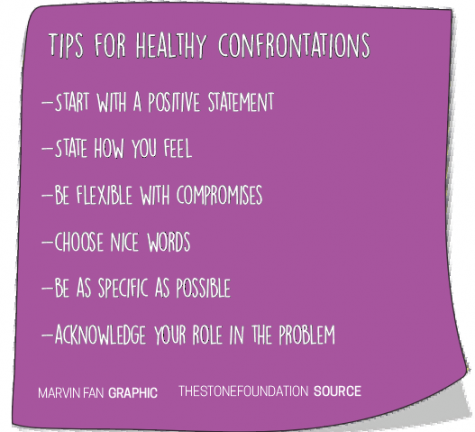
Growing up, I always thought the right thing to do in any argument was to be diplomatic and maintain the peace. I was shy and quiet and avoided any sort of argument like the plague. Honestly, I remember feeling neglected and ignored by people, but rather than voicing my concerns, I kept letting it slide. But today, I value being far more vocal and assertive, even if it means losing a few friends along the way.

I think the word “confrontational” holds a lot of stigma and misconception; people often associate the word with a full-blown argument. Truthfully, being confrontational or taking command is really just a part of standing up for yourself, and making sure that you’re voicing your concerns. It never has to be take a harsh tone if your intentions are in the right place. Being assertive might mean asking for a promotion when you’ve worked hard for it, or telling a friend not to trash talk you behind your back because you deserve better.
Confrontation isn’t just about winning an argument or proving that you’re always right. It’s about bringing important issues to the table, and recognizing that your opinion matters.
On the other hand, being assertive shouldn’t be used just for argumentation. It’s always important to assess what you’re getting yourself into at the end of the day. Confrontation and argumentation can end in ugly, messy fights if you’re not careful. Someone should always pick and choose their battles and be willing to understand where they’re wrong before starting an argument over petty things.

But one thing I’ve learned is that without being assertive, the anger can build up, even for smaller, trivial things. If you don’t bring issues out into the open, feelings like anger and frustration can get bottled up over time until they explode. You can build a subconscious resentment towards someone, which inevitably causes strain in a relationship. At the end of the day, if you do value being respected over being liked, then it’s important you fight back when it comes to non-negotiable issues.
I really value confrontation because it’s a sign of honesty and maturity. When you confront a friend, you choose to speak with them directly instead of gossiping to five other people before them about it. When you stand up for someone being bullied, you put fear behind you and courage in front of you.
At the end of the day, becoming more outspoken and assertive is one of the best decisions and changes I’ve made towards mycharacter. When you look at it holistically, it makes a lot of sense. Got a problem with someone? Instead of overanalyzing the problem or hiding your feelings, just let them know.
The views in this column do not necessarily reflect the views of the HiLite staff. Reach Sowmya Chundi at [email protected]
Read an opposing column by Leah Tan here.




























![Keep the New Gloves: Fighter Safety Is Non-Negotiable [opinion]](https://hilite.org/wp-content/uploads/2024/12/ufcglovescolumncover-1200x471.png)
















































![Review: “We Live in Time” leaves you wanting more [MUSE]](https://hilite.org/wp-content/uploads/2024/12/IMG_6358.jpg)
![Review: The premise of "Culinary Class Wars" is refreshingly unique and deserving of more attention [MUSE]](https://hilite.org/wp-content/uploads/2024/12/MUSE-class-wars-cover-2.png)
![Introducing: "The Muses Who Stole Christmas," a collection of reviews for you to follow through winter [MUSE]](https://hilite.org/wp-content/uploads/2024/12/winter-muse-4.gif)
![Review: "Meet Me Next Christmas" is a cheesy and predictable watch, but it was worth every minute [MUSE]](https://hilite.org/wp-content/uploads/2024/11/AAAAQVfRG2gwEuLhXTGm3856HuX2MTNs31Ok7fGgIVCoZbyeugVs1F4DZs-DgP0XadTDrnXHlbQo4DerjRXand9H1JKPM06cENmLl2RsINud2DMqIHzpXFS2n4zOkL3dr5m5i0nIVb3Cu3ataT_W2zGeDAJNd_E-1200x884.jpg)
![Review: "Gilmore Girls", the perfect fall show [MUSE]](https://hilite.org/wp-content/uploads/2024/11/gilmore-girls.png)
![Review in Print: Maripaz Villar brings a delightfully unique style to the world of WEBTOON [MUSE]](https://hilite.org/wp-content/uploads/2023/12/maripazcover-1200x960.jpg)
![Review: “The Sword of Kaigen” is a masterpiece [MUSE]](https://hilite.org/wp-content/uploads/2023/11/Screenshot-2023-11-26-201051.png)
![Review: Gateron Oil Kings, great linear switches, okay price [MUSE]](https://hilite.org/wp-content/uploads/2023/11/Screenshot-2023-11-26-200553.png)
![Review: “A Haunting in Venice” is a significant improvement from other Agatha Christie adaptations [MUSE]](https://hilite.org/wp-content/uploads/2023/11/e7ee2938a6d422669771bce6d8088521.jpg)
![Review: A Thanksgiving story from elementary school, still just as interesting [MUSE]](https://hilite.org/wp-content/uploads/2023/11/Screenshot-2023-11-26-195514-987x1200.png)
![Review: "When I Fly Towards You", cute, uplifting youth drama [MUSE]](https://hilite.org/wp-content/uploads/2023/09/When-I-Fly-Towards-You-Chinese-drama.png)
![Postcards from Muse: Hawaii Travel Diary [MUSE]](https://hilite.org/wp-content/uploads/2023/09/My-project-1-1200x1200.jpg)
![Review: "Ladybug & Cat Noir: The Movie," departure from original show [MUSE]](https://hilite.org/wp-content/uploads/2023/09/Ladybug__Cat_Noir_-_The_Movie_poster.jpg)
![Review in Print: "Hidden Love" is the cute, uplifting drama everyone needs [MUSE]](https://hilite.org/wp-content/uploads/2023/09/hiddenlovecover-e1693597208225-1030x1200.png)
![Review in Print: "Heartstopper" is the heartwarming queer romance we all need [MUSE]](https://hilite.org/wp-content/uploads/2023/08/museheartstoppercover-1200x654.png)



